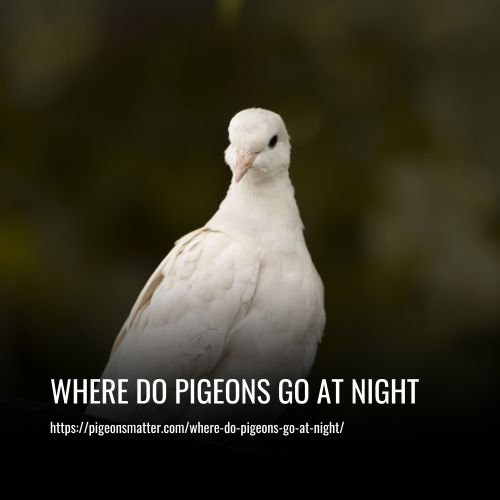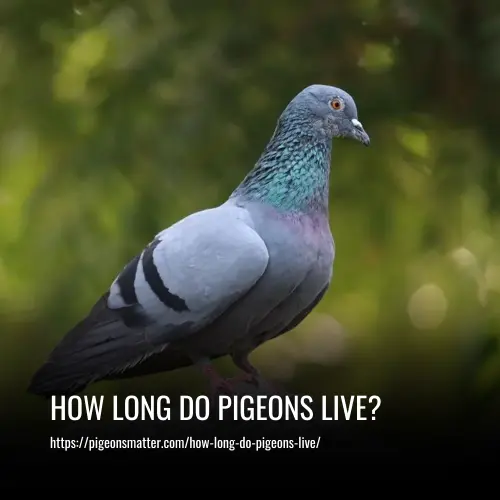Pigeons roost at night, seeking sheltered areas like trees, buildings, ledges, and other structures to rest and stay safe from predators. They often nest and roost in urban environments, finding shelter on building ledges, under bridges, or in man-made structures. Pigeons are adaptable birds and can be found in both urban and rural settings worldwide.

Where Do Pigeons Sleep?
Pigeons are a common sight during the day, but have you ever wondered where they go at night? Here’s a closer look at where pigeons sleep and what they do in the dark. Pigeons are known to sleep in a variety of places, including trees, rooftops, and ledges. They prefer to sleep in elevated areas that are safe from predators and provide a good vantage point for detecting danger.
Pigeons are also social animals and often sleep in groups. This not only provides safety in numbers but also helps to keep them warm during colder months. When the sun goes down, pigeons will typically find a safe and comfortable spot to roost for the night. They will huddle together and rest until morning when they resume their daily activities.
Overall, pigeons are adaptable creatures that can sleep in a variety of locations. As long as they feel safe and secure, they will find a place to rest and recharge for the next day.
Where Do Pigeons Sleep at Night?
Pigeons are subject to predation by a range of natural predators, such as foxes, owls, hawks, domestic cats, and humans. As diurnal birds, they are more active during the day and have poor night vision, so finding a safe place to sleep at night is crucial. Pigeons prefer locations that provide shelter from the elements and are close to reliable sources of food.
In rural areas, pigeons often roost in trees or large bushes, taking advantage of the protection provided by the dense foliage. Coastal pigeons may roost on cliffsides for added protection. In urban areas, pigeons will sleep on ledges, bridges, lampposts, and electrical wires, as long as they are out of reach of predators and humans.
Pigeons are known for their ability to adapt and sleep in various locations, even if they are exposed, ensuring their safety and warmth for the night.
What Do Baby Pigeons Look Like? Where Are They?
If you’ve ever wondered what baby pigeons look like, you’re not alone. It’s rare to see them because they grow up quickly and leave the nest within 30-40 days.
Once the breeding season is over and the parent pigeons have raised their young, the juvenile pigeons become independent and leave the nest on their own. The adult pigeons abandon their nests and seek out safe places to sleep at night.
Pigeons tend to choose a secluded shelter over their nests when they have no young to care for. This behavior ensures the safety and well-being of the pigeons and their young.
Do Pigeons Stay Alone In The Night?
Pigeons are social creatures that prefer living in large flocks of up to 500 birds. This convivial nature means that they dislike being alone or in pairs and will seek out the company of other pigeons. During the nighttime, these birds will congregate in a communal shelter to rest, resulting in the formation of sizable flocks.
These shelters typically house a significant number of pigeons from the same neighborhood, so if you come across one, you can expect to find a cluster of pigeons huddled together for warmth and safety. Pigeons are known for their friendly and communal behavior, making them a fascinating species to observe.
Why Do The Pigeons Sleep Together?
Pigeons are communal creatures that prefer to stick together. They roost in flocks at night, sleeping alongside numerous other pigeons in the same shelter. This provides them with a sense of protection and warmth, allowing them to snuggle up to one another. Additionally, living together in a group helps protect them from predators such as cats, hawks, and rats.
Pigeons can produce an alerting sound by flapping their wings, which can help them communicate potential danger to each other. If one pigeon detects a predator, the alarm sound of its wings will inform others of the threat, allowing them to guard themselves or fly away to safety.
Pigeons Don’t Sleep in Their Nests
Contrary to popular belief, birds do not sleep in their nests at night. While nests are used to keep eggs and babies warm and safe, they are not used for sleeping once nesting season is over.
In fact, nests can become a hazard as they attract predators and quickly become messy with droppings. Birds find other safe places to sleep at night, such as tree branches, shrubs, or even on the ground. It’s important to understand the habits and behaviors of birds to provide them with a safe and healthy environment.
Pigeons Don’t Fly At Night
During a winter artist residency in Stockholm, the author was struck by the effect of the city’s limited daylight on daily life. This led to the idea to release pigeons with LED lights attached to their legs, creating a beautiful light display in the sky. The author’s interest in pigeons stems from their use in aerial photography and spying activities during wartime.
However, the project had to be canceled due to pigeons’ difficulty in navigating in the dark. Recent research suggests that pigeons have multiple navigational tools, including a magnetic compass and scent compass, but their maps and charts are still largely unknown. Training can help pigeons become night-flying, but their biological clock must also be reset.
When Do Pigeons Sleep At Night?
Pigeons, like many birds, sleep for an average of 10 hours at night. It can be difficult to determine the exact time when a pigeon falls asleep, but typically they disappear from sight as the sun begins to set. Pigeons have a natural inclination to seek shelter and gather in flocks as the environment grows dimmer.
Studies show that diurnal birds tend to seek out safe spots and sleep as soon as it gets dark and the sun fully sets, sleeping for around 10-12 hours during the night.
If you’re observing pigeons, it’s important to note their sleeping habits to ensure their well-being. Providing a safe and comfortable roosting area can help them get the rest they need to stay healthy.
How Do Pigeons Sleep?
Pigeons have a unique way of sleeping called cooping, where they tuck their heads into their feathers and appear plump. This posture is possible due to the exceptional flexibility of their necks. They often do this during the day, taking power naps to reenergize themselves.
However, they are not in deep sleep and instead are half-sleeping due to a survival mechanism called unihemispheric slow-wave sleep. This allows one half of their brain to sleep while the other remains active, keeping half their body awake to protect themselves from predators. This ability also allows them to sleep with one eye open.
Can Pigeons Be Sleep Deprived?
Pigeons have a sleep pattern that enables them to remain alert while resting. Their behavior shows that they have a tendency to be partially awake and active during daytime hours. This enables them to rest on various surfaces while remaining alert.
Pigeons have the ability to enter into deeper sleep when they are sleep deprived, which enables them to meet their rest requirements without the need for additional sleep time.
Pigeons have the ability to sleep on tree branches due to their talons, which provide a strong reflex grip that anchors them onto a supporting structure and prevents falls while sleeping. This adaptation ensures a safe and comfortable resting environment for pigeons.
Does Light Disturb The Pigeons At Night?
Bright lighting around pigeon shelters at night can disrupt their sleep and affect their health and behavior. Pigeons, like many birds, prefer to sleep in spaces with low light. Exposure to bright lights during sleep can negatively impact their brain activity, development, and ability to reproduce and forage for food. To help pigeons sleep well, measures can be taken to control the intensity of light around their sleeping areas.
This includes switching off porch lights, removing decorative lights, and placing street and park lights facing the ground. Artificial light should be used only when necessary to minimize its impact on the birds. Proper sleep is essential for the optimal functioning and well-being of pigeons and other birds.
Do Pigeons Sleep In The Same Place Every Night?
Pigeons are known to prefer covered, warm, and protected areas to sleep in, but do they sleep in the same place every night? The answer is no. Pigeons typically do not sleep in the same location every night, often choosing to rest in the same general area where they spend their days. This helps them to know the area better and feel more secure. Pigeons remain in an area as long as there is a reliable source of food or until the area poses a threat from predators or traffic.
They may choose to sleep on a rooftop above their favorite daytime hangout spot or tuck away on a windowsill or balcony nearby. However, they are never too far from where they frequent during the day. So, if you see pigeons in your area during the day, chances are they’re sleeping nearby at night.
What Do Pigeons Do During The Day?
Pigeons may not lead the most exciting lives, but they have become iconic city-dwellers due to their impact on people. During the day, pigeons engage in activities such as eating, resting, and mating to fulfill their basic needs. While their daily routine may seem mundane, their presence has made them well-known to people all over the world.
Pigeons have become iconic due to their ability to adapt to urban environments and their unique characteristics. They are known for their distinctive cooing sounds and their tendency to gather in large flocks.
Their ability to navigate using the earth’s magnetic fields has also made them fascinating to scientists and bird enthusiasts alike. Overall, despite their simple daily routine, pigeons have captured the attention and admiration of many.
How Long Pigeons Sleep at Night
Pigeons have a unique sleeping pattern that allows them to get plenty of rest. They sleep for 10 hours straight at night and do not suffer from sleep deprivation.
Pigeons fall asleep after sunset when it becomes completely dark. In the summertime, when the sun sets later, individuals may experience a decrease in their amount of sleep. It is uncommon to see them walking around at night as they prefer to sleep during this time.
If there is any noise that disturbs their sleep, pigeons may wake up, but they typically only stay awake if it is absolutely necessary.
FAQs
Pigeons have a remarkable ability to navigate using the Earth’s magnetic field, the sun, and visual landmarks to find their way back to their roost at night.
Pigeons can make cooing and rustling sounds at night, especially if they are disturbed or searching for a roosting spot. However, they are generally quiet when they are settled in for the night.
Pigeons often roost in groups, especially in urban areas where there are many pigeons. However, they may also roost alone or in smaller groups, depending on the availability of space and resources.
If you are concerned about the well-being of pigeons in your area, consider providing them with nesting boxes or safe roosting spots to help protect them from predators and the elements.
Pigeons do not build traditional nests like some other birds. Instead, they often roost in groups, especially in urban areas, and may huddle together for warmth.
Pigeons are known for their homing instincts and can navigate back to their roosting spots using visual landmarks, the position of the sun, and the Earth’s magnetic fields.
While pigeons are primarily active during the daytime, they may also be seen flying and moving around at night as they search for food and water or adjust their roosting spot.
Pigeons are not considered nocturnal, as they are most active during daylight hours, but they can be active at night to some extent.
Conclusion
The mystery of where pigeons go at night may never be fully solved. But one thing is certain: these birds are fascinating creatures that have adapted to thrive in urban environments.
So the next time you see a group of pigeons perched on a building or flying overhead, take a moment to appreciate their resilience and resourcefulness. And who knows, maybe one day we’ll finally uncover the secret of where they go when the sun sets.


